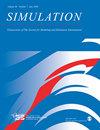模块驱动的集装箱码头仿真模型构建体系结构的建议:通用、灵活和模块化原则的应用困境
IF 2
4区 工程技术
Q4 COMPUTER SCIENCE, INTERDISCIPLINARY APPLICATIONS
Simulation-Transactions of the Society for Modeling and Simulation International
Pub Date : 2023-01-12
DOI:10.1177/00375497221144646
引用次数: 1
摘要
集装箱码头是一个复杂的系统,在这里,集装箱货物要经过一系列的加工和处理操作,才能送到他们的出站模式。已经开发了一套决策支持方法和模拟模型,以协助规划人员和管理人员对日常业务作出决策。然而,大多数都是为特定的终端而不是通用类型设计的。实际上,通用模型可以作为一个概念工厂来创建特定的模型,这大大减少了开发的时间和精力;然而,建立这样一个模型绝非易事。为此,本文讨论了在系统建模中应用通用性、灵活性和模块化的复杂性,并提出了一种通用的体系结构来构建模块化和柔性的集装箱码头仿真模型。该体系结构被分成一组较小的、可管理的、连接良好的通用模块,这些模块有助于创建高度参数化的特定模型。在一个案例研究中,提出了一个架构使用的说明性示例,即斯德哥尔摩的新集装箱码头,并由主题专家验证了所得到的模型。最后,为验证该方法的有效性,利用实际数据对研究系统在不同处理和流量情况下的处理能力进行了数值研究。结果表明,如果在现有船队中再增加3至4艘跨界运输船,码头的处理能力可增加约50%。本文章由计算机程序翻译,如有差异,请以英文原文为准。
Proposal of a module-driven architecture for building simulation models devoted to container terminals: dilemmas in applying generic, flexible, and modular principles
Container terminals are complex systems where containerized cargo undergoes a set of processing and handling operations to be delivered to their outgoing modes. A pool of decision support methods and simulation models has been developed to assist planners and managers in making decisions about daily operations. Nevertheless, most are designed for a particular terminal and not generic types. Indeed, a generic model serves as a conceptual factory to create specific models which greatly reduces the time and efforts of development; however, building such a model is no mean feat. To this aim, the paper on hand discusses the complexity of applying genericity, flexibility, and modularity in system modeling and proposes a generic architecture to build modular and flexible simulation models for container terminals. This architecture is split into a set of smaller, manageable, well-connected, and generic modules that facilitate the creation of highly parametrized specific models. An illustrative example of the architecture usage is presented in a case study, the new container terminal of Stockholm, and the resulting models were validated by subject matter experts. Finally, to prove its efficiency, a numerical study fed with real data is conducted to investigate the handling capacity of the studied system under different handling and flow scenarios. The obtained results show that the terminal handling capacity can be increased by around 50% if three to four more straddle carriers are added to the existing fleet.
求助全文
通过发布文献求助,成功后即可免费获取论文全文。
去求助
来源期刊
CiteScore
3.50
自引率
31.20%
发文量
60
审稿时长
3 months
期刊介绍:
SIMULATION is a peer-reviewed journal, which covers subjects including the modelling and simulation of: computer networking and communications, high performance computers, real-time systems, mobile and intelligent agents, simulation software, and language design, system engineering and design, aerospace, traffic systems, microelectronics, robotics, mechatronics, and air traffic and chemistry, physics, biology, medicine, biomedicine, sociology, and cognition.

 求助内容:
求助内容: 应助结果提醒方式:
应助结果提醒方式:


